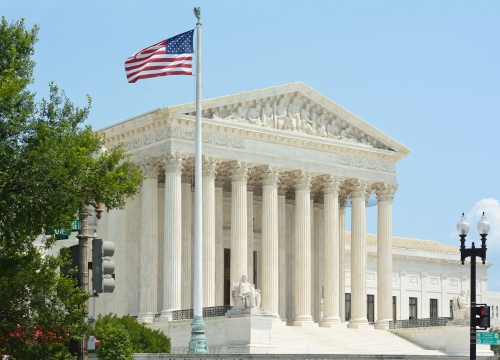The Mission Product case, which will be argued at the Supreme Court on February 20, raises a number of questions at the intersection of trademark and bankruptcy law, including whether Section 365(n) reflected a congressional intent that trademark licenses should be terminable by debtor-licensors.
 On February 20, the Supreme Court will hear oral argument in Mission Product Holdings Inc. v. Tempnology, LLC on appeal from the Court of Appeals for the First Circuit. The case presents the question of whether a debtor-licensor’s rejection of an executory trademark license agreement in bankruptcy, pursuant to 11 U.S.C. § 365, results in the agreement’s complete termination, including loss of the licensee’s right to use the licensed trademark. Given that trademarks are the most widely used form of registered intellectual property, and trademark rights often are among a debtor’s key assets, the treatment of the debtor’s licenses of those rights is an issue that arises frequently in the bankruptcy context. For this reason, among others, the issue presented by this case has been hailed by the International Trademark Association (INTA) as “the most significant unresolved legal issue in trademark licensing.”
On February 20, the Supreme Court will hear oral argument in Mission Product Holdings Inc. v. Tempnology, LLC on appeal from the Court of Appeals for the First Circuit. The case presents the question of whether a debtor-licensor’s rejection of an executory trademark license agreement in bankruptcy, pursuant to 11 U.S.C. § 365, results in the agreement’s complete termination, including loss of the licensee’s right to use the licensed trademark. Given that trademarks are the most widely used form of registered intellectual property, and trademark rights often are among a debtor’s key assets, the treatment of the debtor’s licenses of those rights is an issue that arises frequently in the bankruptcy context. For this reason, among others, the issue presented by this case has been hailed by the International Trademark Association (INTA) as “the most significant unresolved legal issue in trademark licensing.”
The Lubrizol Split
The question of how trademark rights should be treated in this context has split the circuits and has led to uncertainty in the market for trademark licenses. The present case before the Supreme Court is expected to resolve the circuit split that traces back to the Fourth Circuit’s 1985 decision in Lubrizol Enters., Inc. v. Richmond Metal Finishers, Inc., 756 F.2d 1043 (4th Cir. 1985).
In Lubrizol, the Fourth Circuit held rejection of an executory license agreement by a debtor-licensor terminates the license. Although Congress abrogated Lubrizol’s result by amending the Bankruptcy Code in 1987 as to licensee of patents, copyrights, and trade secrets (11 U.S.C. § 365(n)), it expressly left open the impact of rejection on trademark license agreements for further study and consideration. With respect to trademark licenses, Lubrizol remains good law in the Fourth Circuit and courts in some other circuits continue to rely on Lubrizol in holding that a licensee’s rights are terminated upon rejection.
A number of courts have disagreed with Lubrizol, notably the Seventh Circuit in Sunbeam Prods. Inc. v. Chicago Am. Mfg., LLC in 2012. In that case, the Seventh Circuit held that, although rejection eliminates the debtor-licensor’s obligation to perform under the agreement, it does not terminate the licensee’s right to continue to use the trademark for the duration of the agreement. That is, the rejection relieves the licensor of any obligations under the agreement and is a breach that may cause harm to the licensee for which the licensee might have a remedy, but the licensee may continue to use the licensed mark. Under the Seventh Circuit’s reasoning, rejection does not terminate either the licensee’s right to continue using the licensed mark or its obligation to continue to comply with the license. Those obligations might include making any necessary royalty payments and maintaining quality control, which the licensor may continue to enforce.
Trademarks Meet Bankruptcy Law
The present case before the Supreme Court raises a number of questions at the intersection of trademark and bankruptcy law, including whether Section 365(n) reflected a congressional intent that trademark licenses should be terminable by debtor-licensors, and whether the rule set forth in Sunbeam would result in “naked” trademark licenses, which can lead to invalidation of the trademark.
A general principle of bankruptcy law is that rejection of an executory contract by a debtor in bankruptcy does not terminate the contract, but simply is a breach, by which the counter-party to the contract would become a creditor with a pre-petition claim for damages against the debtor. The respondent argues that, by adding Section 365(n) to the Bankruptcy Code following Lubrizol, Congress did not intend to amend the general rule that a licensee-creditor’s only remedy for a rejected license agreement is a suit for damages. In the respondent’s view, a trademark license creates only a contractual right for the licensee to use the mark – not a property interest – and that rights granted under the license, such as exclusivity rights or distribution rights, cannot be enforced by the licensee against the debtor following rejection of the contract. The respondent argues that, by consciously excluding trademarks from the scope of Section 365(n), rejection of a trademark license agreement by a debtor-licensor deprives the licensee of the right to continue using the mark.
In contrast, the petitioner has argued that a trademark represents a property interest that the debtor-licensor cannot take back in bankruptcy because the Bankruptcy Code does not permit a debtor, through rejection and breach of an executory contract, to revoke and reclaim property that it had previously granted to third parties. In the petitioner’s view, Section 365(n) creates no negative inference that rejection terminates the rights of a trademark licensee, and that rejection is “not a special bankruptcy ‘power’ that can change the non-bankruptcy rights of the party to the contract.”
The ‘Naked License’ Problem
The case also raises questions about the validity of trademarks owned by debtors that reject executory trademark licenses. A trademark is a designation used to identify and distinguish the source of goods and services of a person or company and helps guide consumers to the products and services they want, with reliable assurances of source and quality. Under the Lanham Act, a trademark owner can validly license a trademark or service mark to another to use, but in order to protect consumers, the Act requires that the licensor exercise control over the nature and quality of the goods and/or services sold by the licensee under the licensed mark. A license granted without any such quality control is deemed a “naked license” because it is lacking in a necessary condition for the validity of a license agreement. The Lanham Act reflects a decision by Congress to afford trademark owners the right to license marks in exchange for their statutory obligation to retain quality control over the mark’s use, for the purpose of ensuring the protection of the public. If the trademark owner fails to fulfill its affirmative duty to police the mark as used by its licensee, it may lose some or all of its rights in the mark.
The respondent has argued that the Sunbeam approach that would permit a licensee to continue to use a trademark that is the subject of a rejected license agreement places the debtor-licensor in the position of choosing between (1) retaining burdensome obligations associated with monitoring quality control, or (2) abandoning a valuable trademark to the public domain by letting it become a naked license. In contrast, the petitioner has argued that the quality-control burden is imposed by trademark law generally applicable to all trademark owners, not by contract. And, moreover, it is not a performance obligation owed to the licensee, but an action taken for the benefit of the licensor, to preserve the value of its mark. In other words, a licensor that wishes to maintain a valid trademark must comply with minimal quality control measures whether in or out of bankruptcy.
Next Week’s Argument
These are just some of the key issues on which the Supreme Court likely will focus at oral argument, during which the United States Solicitor General has been granted time to argue. Significantly, the Solicitor General has weighed in in support of the petitioner, arguing that the Court should adopt the rule articulated in Sunbeam because, among other reasons, outside of bankruptcy, a licensor cannot unilaterally revoke a trademark license, and because the omission of trademarks from Section 365(n) does not indicate that Congress intended the Lubrizol rule to control in the trademark context. A number of amici curiae also have submitted briefs:
- The International Trademark Association filed a brief in support of the petitioner (which the authors of this column co-authored), arguing that the Court should adopt the rule articulated in Sunbeam because that rule promotes the strength and stability of the trademark system for the benefits of all participants, and, ultimately for consumers.
- A group of law professors filed a brief in support of the petitioners to identify a consensus among legal scholars that rejection of a contract under the Bankruptcy Code constitutes a breach of the license and not a rescission. The brief argued that the Court should recognize the scholarly consensus and resolve the circuit split in favor of the rule articulated in Sunbeam.
- The New York Intellectual Property Law Association filed a brief in support of the petitioner, arguing that the rejection under the Bankruptcy Code of a trademark license agreement by a debtor-licensor does not authorize the debtor-licensor to terminate the trademark license agreement.
- The Intellectual Property Owners Association filed a brief in support of neither party, arguing that the issues raised by this case are best addressed by Congress, and until Congress acts, the Court should not adopt a categorical rule, but rather should take an equitable approach that considers the facts of each case.
- The American Intellectual Property Law Association filed a brief in support of neither party, arguing that whether a trademark licensee retains its rights to use the licensed mark following the debtor-licensor’s rejection of an executory contract containing a trademark license should be determined under applicable non-bankruptcy law, which turns on the language of the particular contract at issue.
We expect to provide an update on the argument in another column on IPWatchdog.com next week.
Image Source: Deposit Photos
Image ID: 52674523
Copyright: etienjones

![[IPWatchdog Logo]](https://ipwatchdog.com/wp-content/themes/IPWatchdog%20-%202023/assets/images/temp/logo-small@2x.png)


![[Advertisement]](https://ipwatchdog.com/wp-content/uploads/2024/04/Patent-Litigation-Masters-2024-sidebar-early-bird-ends-Apr-21-last-chance-700x500-1.jpg)

![[Advertisement]](https://ipwatchdog.com/wp-content/uploads/2021/12/WEBINAR-336-x-280-px.png)
![[Advertisement]](https://ipwatchdog.com/wp-content/uploads/2021/12/2021-Patent-Practice-on-Demand-recorded-Feb-2021-336-x-280.jpg)
![[Advertisement]](https://ipwatchdog.com/wp-content/uploads/2021/12/Ad-4-The-Invent-Patent-System™.png)







Join the Discussion
No comments yet.